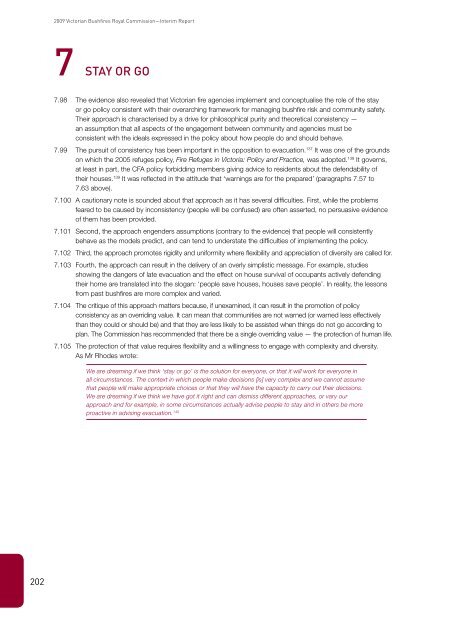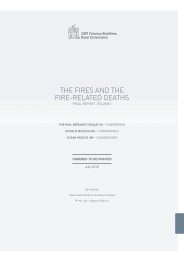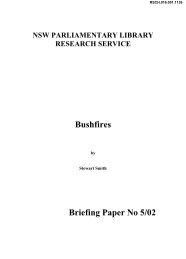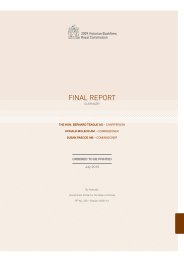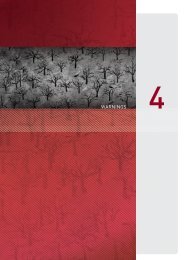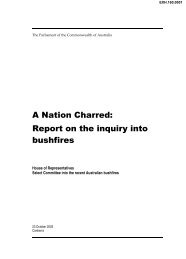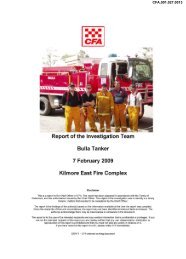Chapter 7 - Stay or go - 2009 Victorian Bushfires Royal Commission
Chapter 7 - Stay or go - 2009 Victorian Bushfires Royal Commission
Chapter 7 - Stay or go - 2009 Victorian Bushfires Royal Commission
You also want an ePaper? Increase the reach of your titles
YUMPU automatically turns print PDFs into web optimized ePapers that Google loves.
<strong>2009</strong> Vict<strong>or</strong>ian <strong>Bushfires</strong> <strong>Royal</strong> <strong>Commission</strong>—Interim Rep<strong>or</strong>t<br />
7 <strong>Stay</strong> <strong>or</strong> Go<br />
7.98<br />
The evidence also revealed that Vict<strong>or</strong>ian fire agencies implement and conceptualise the role of the stay<br />
<strong>or</strong> <strong>go</strong> policy consistent with their overarching framew<strong>or</strong>k f<strong>or</strong> managing bushfire risk and community safety.<br />
Their approach is characterised by a drive f<strong>or</strong> philosophical purity and the<strong>or</strong>etical consistency —<br />
an assumption that all aspects of the engagement between community and agencies must be<br />
consistent with the ideals expressed in the policy about how people do and should behave.<br />
137<br />
7.99 The pursuit of consistency has been imp<strong>or</strong>tant in the opposition to evacuation. It was one of the grounds<br />
on which the 2005 refuges policy, Fire Refuges in Vict<strong>or</strong>ia: Policy and Practice, was adopted. 138 It <strong>go</strong>verns,<br />
at least in part, the CFA policy f<strong>or</strong>bidding members giving advice to residents about the defendability of<br />
their houses. 139 It was reflected in the attitude that ‘warnings are f<strong>or</strong> the prepared’ (paragraphs 7.57 to<br />
7.63 above).<br />
7.100 A cautionary note is sounded about that approach as it has several difficulties. First, while the problems<br />
feared to be caused by inconsistency (people will be confused) are often asserted, no persuasive evidence<br />
of them has been provided.<br />
7.101 Second, the approach engenders assumptions (contrary to the evidence) that people will consistently<br />
behave as the models predict, and can tend to understate the difficulties of implementing the policy.<br />
7.102<br />
Third, the approach promotes rigidity and unif<strong>or</strong>mity where flexibility and appreciation of diversity are called f<strong>or</strong>.<br />
7.103 Fourth, the approach can result in the delivery of an overly simplistic message. F<strong>or</strong> example, studies<br />
showing the dangers of late evacuation and the effect on house survival of occupants actively defending<br />
their home are translated into the slogan: ‘people save houses, houses save people’. In reality, the lessons<br />
from past bushfires are m<strong>or</strong>e complex and varied.<br />
7.104 The critique of this approach matters because, if unexamined, it can result in the promotion of policy<br />
consistency as an overriding value. It can mean that communities are not warned (<strong>or</strong> warned less effectively<br />
than they could <strong>or</strong> should be) and that they are less likely to be assisted when things do not <strong>go</strong> acc<strong>or</strong>ding to<br />
plan. The <strong>Commission</strong> has recommended that there be a single overriding value — the protection of human life.<br />
7.105 The protection of that value requires flexibility and a willingness to engage with complexity and diversity.<br />
As Mr Rhodes wrote:<br />
We are dreaming if we think ‘stay <strong>or</strong> <strong>go</strong>’ is the solution f<strong>or</strong> everyone, <strong>or</strong> that it will w<strong>or</strong>k f<strong>or</strong> everyone in<br />
all circumstances. The context in which people make decisions [is] very complex and we cannot assume<br />
that people will make appropriate choices <strong>or</strong> that they will have the capacity to carry out their decisions.<br />
We are dreaming if we think we have <strong>go</strong>t it right and can dismiss different approaches, <strong>or</strong> vary our<br />
approach and f<strong>or</strong> example, in some circumstances actually advise people to stay and in others be m<strong>or</strong>e<br />
proactive in advising evacuation. 140<br />
202


